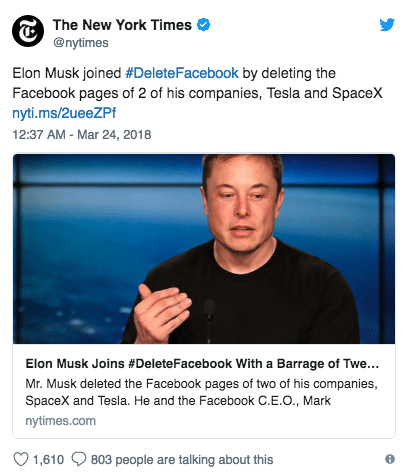Will you #DeleteFacebook?

It was a tough week over at Facebook-land. News of a massive data breach leaked, Zuckerberg apologized, and the stock took a 6% hit. All of those are just bumps in the road compared to the impact that the #DeleteFacebook movement could have.

Facebook has managed to weather a lot of scandals and questionable uses of data because all of their growth charts went up and to the right. As long as your friends continue to flock there, you’re not leaving anytime soon.
This week, however, there have been some real concerns that there may be a perfect storm of circumstances that could lead to see the mighty peak, and even backslide a bit. The general sentiment around Facebook has been degrading for a while. Rather than being the cool new place to pst updates, it’s now often seen as the mandatory platform that everyone is forced to use because there aren’t any other good options.
At the same time, user behaviour has started to shift towards more niche, specific channels of communication – Twitch, Facebook Groups, Dribble, and WhatsApp Groups are all examples of communities of people choosing to share more openly and frequently in a variety of topic or relationship-specific places than public posting format. But Facebook’s got a foothold in there, right? They’ve introduced Groups, there are Private Instagram accounts, they own WhatsApp and a lot of other semi-private places to share. That’s true, but it’s contrary to the core reason why Facebook is the behemoth that it is: The Newsfeed.
The Newsfeed is a magical place for Facebook – it’s easy for advertisers to understand, its ad units can be bought at scale, and its effective because people are scrolling through their Instagram and Facebook Newsfeeds looking for a little bit of everything. If we, as users, start to shift away from that behaviour and start spending the majority of our screen time in niche, semi-private places, then the magic is gone.
So, we ran a little experiment to see if all of this chatter is just talk, or if people are serious about moving away from the big bad Facebook, and we ran a Twitter poll. The results:
What’s your real-talk reaction to the Facebook data breach?
— Junction (@JunctionYVR) March 23, 2018
Pretty mixed.
The poll, while far from scientific, reveals that there’s a wide range of reaction to the news. But remember, the thing that makes Facebook attractive is the network effect. Typically we think of the network effect in positive terms: Additional nodes (or in this case, people) being added on multiply the benefit, creating an exponential growth of the value of the network. If Facebook’s user growth really is peaking, then we need to start thinking about the accelerating loss of value that millions of disengaged users could have.
If our poll is any indication (again, 199 people on Twitter is not a reliable sample), there is a passionate minority who just may care enough to go through with it. When there is no longer the feeling that “everyone” is on Facebook, and other viable community hubs start popping up, then we could see the number of users logging in fall off a cliff.
Of course, that’s an unlikely scenario, but one that every brand who is investing heavily in Facebook’s platforms should be considering.
So What?
Am I crazy enough to suggest that Twitter is the answer? It is one of the only major platforms that isn’t Facebook-owned, after all.
No, something that looks like the opposite, actually.
When attention shifts in digital, it’s the brands who have a real connection with a community that transition most easily. When brands moved to and from Facebook, YouTube, Path, Twitter, Google+, Vine, Instagram, Pinterest, Snapchat, the ones that had posted beautiful content without substance, and partnered with “influencers” who were relevant only because of their audience sizes had to start from scratch. The brands with a real connection to their community, however, often arrived on the new channel to discover that their fans had beaten them there, and that they were already creating content about their brand in the new space.
I appreciate that’s a pretty vague recommendation, but it’s the truth. When we game a platform, the majority of that benefit is isolated to the platform itself, however emotional connections, reciprocity and belonging all transfer seamlessly. Consider it from this perspective: If Facebook shut down tomorrow and you were forced to transition your personal behaviour, would you be forced to rebuild all of your friendships, or would you simply have to search for the new place that your community had gathered?
How about something tangible?
Invest in email.
Email marketing depends on no single source for its distribution, you own your lists, and therefore isn’t as subject to shifts in the environment.
Yes, it takes some work, and yes, building a list can take time, but it’s the best way to build a tangible asset that the Zuckerbergs of the world can’t take away from us.
Speaking of email… I send out opinions and ideas like these every Monday. If you’d like to be in the loop, pop your information in the box below. We’ll never share or sell your info, and we know that your trust is the most valuable thing that we can earn.


